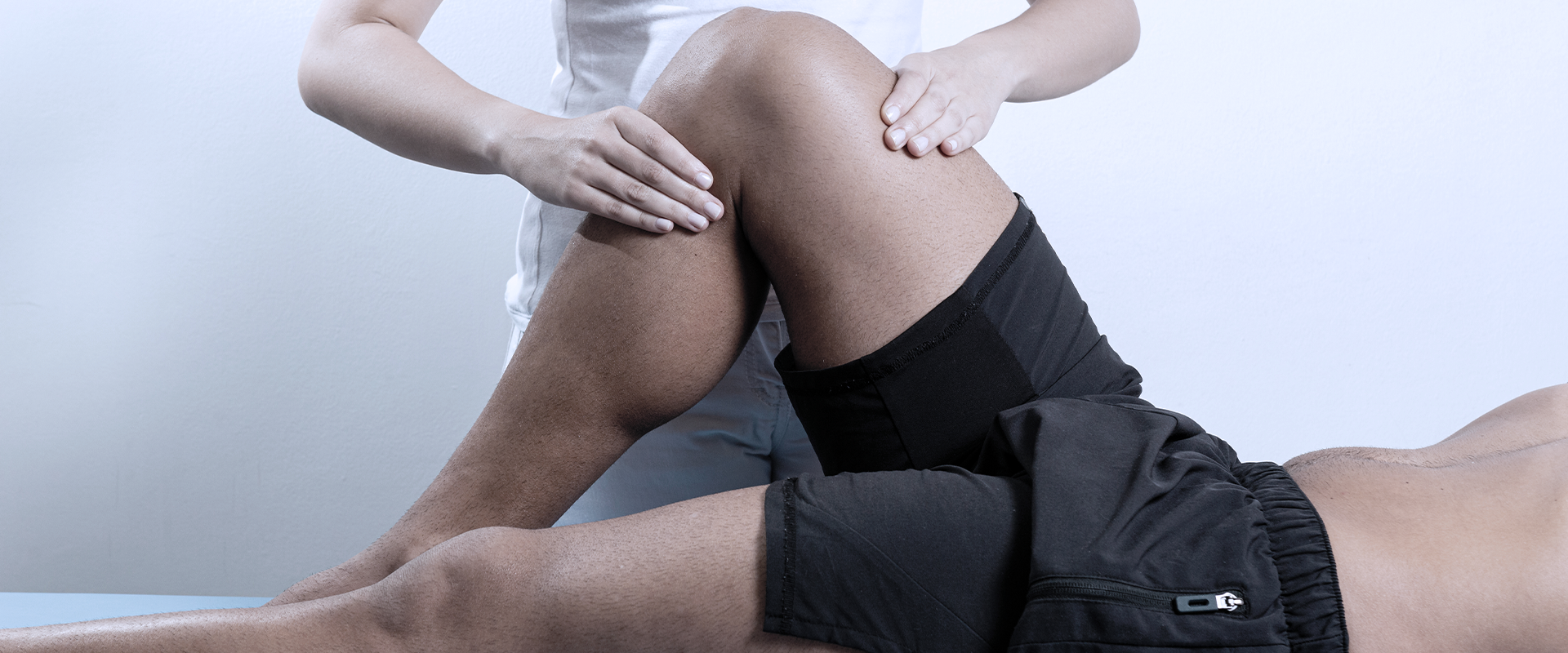
Prehab for Meniscal Repair Surgery
AT EVOLVE
Prehab for Meniscal Repair Surgery
HOW CAN PHYSICAL THERAPY PREPARE ME FOR MENISCUS REPAIR OR RECONSTRUCTION SURGERY?
Facing any surgery can be a bit daunting, but there are steps you can take to help prepare you for the best outcome after surgery. Working with one of our skilled physical therapists prior to your surgery, a concept called “prehabilitation” can help prepare the injured area for the surgery, educate you on what to expect during your recovery and hopefully, shorten overall recovery time.
WHAT DOES PREHABILITATION FOR MENISCUS REPAIR/RECONSTRUCTION SURGERY LOOK LIKE?
Since meniscus surgery is often not an emergency procedure, there is time to consider a course of prehabilitation leading up to surgery. My team of therapists and I will examine your knee and get to know the goals you have for recovery post-surgery. Prior to surgery, we will create a treatment program to help reduce swelling, improve muscle strength and gait mechanics and restore range of motion. Each of these things may help you to recover faster and more completely from meniscus repair surgery.
HOW DO MENISCUS INJURIES OCCUR?
The meniscus (menisci for plural) is a C-shaped cartilage disc that cushions and helps stabilize the knee. There are two of these discs in each knee between the end of the thigh bone (femur) and lower leg bone (tibia). The one on the inside of the knee is called the medial meniscus while the one on the outer side is called the lateral meniscus. Tears in the menisci are categorized as either acute or degenerative. Acute meniscus tears occur suddenly, as an injury, usually when the leg is twisted while the foot is planted and the knee is bent. Degenerative tears occur as a result of general wear and tear in the knee joint.
Symptoms of a meniscus tear can vary somewhat depending on the acuity, location, and severity of the tear. Here are some common symptoms of a meniscus tear:
- An audible or felt popping
- Pain in the knee joint on the inside (medial), outside (lateral), or back of the knee
- Swelling
- Catching or locking of the knee joint
- Pain with walking
- Inability to fully bend or straighten the knee
- Pain when twisting the knee
- Feelings of the knee giving out
MENISCUS TEAR SURGERY
While not all meniscus tears require surgery, your surgeon may have recommended you undergo a surgical repair in order to help restore optimal function to the knee. In general the menisci have less blood supply than other structures in the body. Blood is what carries the nutrients and growth factors and carries away damaged cells to help heal an injury. Because the blood supply is reduced, when torn, the meniscus is less likely to be able to heal on its own. Three main surgical approaches exist for managing meniscus tears:
- Arthroscopic Partial Meniscectomy
- Meniscus Repair
- Meniscus Reconstruction
End Injury Progression
Prehab physical therapy for Meniscal repair surgery has proven to prevent injury, slow and even stop pain issues, improve performance, and reverse injury progression in many cases.
Relieve Pain
The movements used in this technique can target your entire body helping you to manage discomfort and pain during the course of your physical therapy treatments.
Improve Range of Motion
Posture awareness is an important area to focus on due to the fact that certain positions may cause you further discomfort and pain.
Restore Mobility
You can regain mobility and flexibility by taking part in the stretches and exercises as prescribed by your physical therapist.
How Long Will Rehab Physical Therapy for Meniscal Repair Surgery Treatments Last?
If you decide to work with a physical therapist to help with prehab for meniscal repair surgery, your entire treatment plan could consist of around 8-20+ different physical therapy sessions that will each last 60-90 minutes. Once you complete your customized physical therapy treatment plan, you will be able to continue to do the prescribed stretches and exercises utilized during your PT sessions yet in the comfort of your own home.
PREHABILITATION FOR MENISCUS REPAIR AND RECONSTRUCTION SURGERY
For those who opt to undergo reconstruction or repair of the meniscus, there is often a period of waiting that occurs before the surgery is scheduled. During that time, you may opt to undergo a course of prehabilitation in preparation for the upcoming surgery. There are several benefits to this option that are discussed below:
Prepare you for surgery: Most people expect surgery recovery to be an interruption to their normal life. One way to minimize that interruption is to know what to expect ahead of time. Your PT can help advise you on equipment you may need afterwards so you can gather it beforehand. Ice packs, long handled reachers, a shower chair and so forth, may help you complete your daily activities more easily after surgery. It is also likely that you will spend a period of time in modified weight bearing and with a knee brace, meaning you will need a device such as a wheelchair, crutches or a walker. Learning to use these devices ahead of time, when you are not clouded by anesthesia, is a great idea. Additionally, you will have time to ask family members or friends for assistance if you will need it.
Address pain and swelling: Whenever possible, addressing pain and swelling prior to undergoing surgery is a good idea. Some surgeons may even require that your knee can handle some activity without causing severe swelling before they will perform the surgery, in which case physical therapy can be very helpful. Additionally, if there is going to be a waiting period before you can have your surgery, PT can help you be more comfortable by addressing pain as much as possible.
Strength, range of motion, flexibility and gait training: Some strength and flexibility losses are expected in response to surgery and the time period afterwards when you are not able to bear full weight or move the knee through its full range of motion. Because many people have undergone a waiting period between initial injury and surgery wherein they may have reduced their activity level and already began to experience some stiffness, changes in their gait pattern and ever muscle atrophy, it can take quite a while to recover to full knee function after surgery. Since meniscus repair and reconstruction is typically not an emergency surgery, there is time to work with a physical therapist on a progressive exercise program and even a manual therapy program to restore as much strength, flexibility and normal movement in the knee as possible. This will help shorten the post-surgery recovery time.
Our team of physical therapists at Evolve are here for you on both sides of the operating table. If you are planning to undergo meniscus repair or reconstruction surgery, call our clinic today to learn how we can help you and your knee get ready to recover.
Mill Basin (located in Harbor Fitness)
6161 Strickland Ave
Brooklyn, NY 11234
Monday: 7am-8pm
Tuesday: 7am-8pm
Wednesday: 8am-5pm
Thursday: 7am-8pm
Friday: 8am-1pm
Park Slope (located in Harbor Fitness)
550 5th Ave.
Brooklyn, NY 11215
Monday: 9am-8pm
Tuesday: 8am-6pm
Wednesday: 9am-8pm
Thursday: 8am-6pm
Friday: 8am-3pm
Gravesend
372 Avenue U
Brooklyn, NY 11223
Monday-Thursday: 8am-8pm
Friday: 8am-3pm
Ready to take the next step to a healthier you?
Contact Us Today!
PREHAB PHYSICAL THERAPY FOR MENISCAL REPAIR SURGERY!
Need Prehab for Meniscal Repair Surgery?
Let our caring and compassionate physical therapists help you with relieving pain while getting you back on your feet comfortably.
Call now to schedule your first PT consultation free of charge.
Call: 1-718-957-2422







